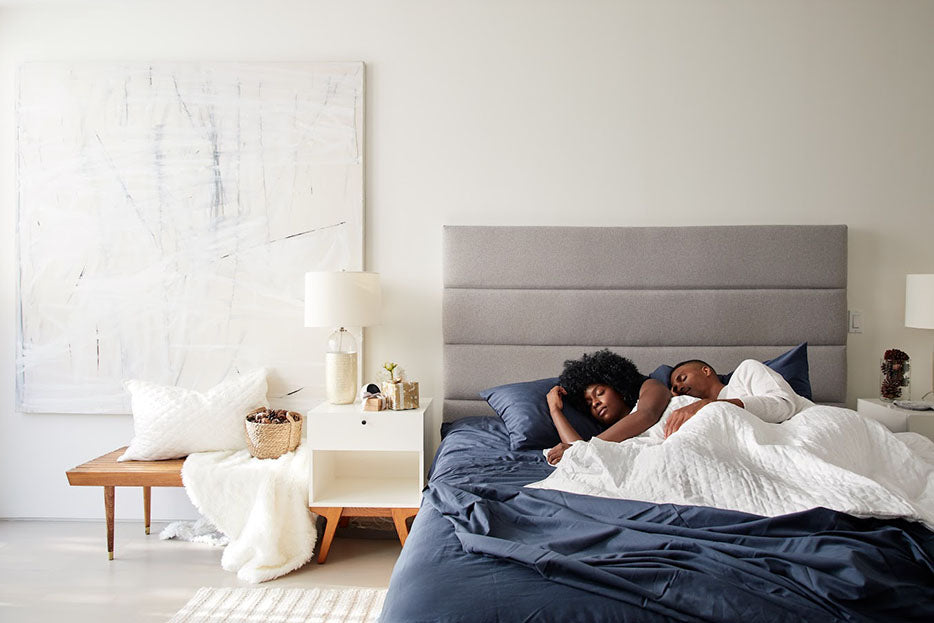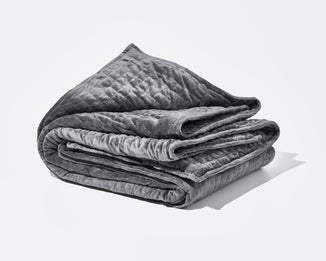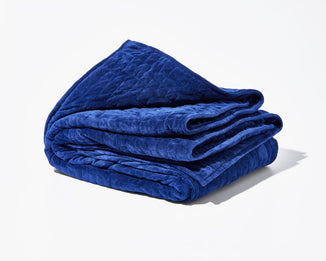
Oct 27, 2021
A Helpful Guide: How to Stop Oversleeping
Let’s face it — nobody enjoys waking up to the sound of an alarm. That annoying “beep, beep, beep” signals that it's time to crawl out from under our cozy weighted blankets, put on our work clothes and start being productive members of society. But if you find yourself hitting the snooze button regularly — or even ignoring your alarm clock altogether — you may want to rethink your sleep habits.
As it turns out, getting too much sleep can be just as problematic as getting insufficient sleep. Oversleeping — defined as sleeping more than nine hours in a 24-hour period — is associated with a host of health problems, including depression, obesity, type 2 diabetes and cardiovascular disease.
The good news is that there are plenty of steps you can take to stop oversleeping and get your sleep schedule back on track. Below, learn more about the causes of oversleeping, the dangers of getting too much snooze and how to stop oversleeping for a healthier, happier you.
Get Better Quality Sleep with a Weighted BlanketHow Much Sleep Do We Need?

There is no "magic number" for the ideal duration of sleep. Sleep needs vary from person to person at any given age, so it's impossible to provide a one-size-fits-all answer. However, current guidelines from the National Sleep Foundation suggest that healthy adults should get between seven to nine hours of shut-eye per night.
Of course, guidelines are just that — guidelines. In reality, the amount of sleep you need comes down to a slew of other factors, including genetics, health and life changes.
So, how do you calculate your personal sleep needs?
One method involves setting aside an entire week, perhaps during a vacation, to allow yourself to sleep in as long as possible. The first few days will likely consist of making up for lost sleep during the week (aka, your sleep debt). By the end of the week, though, you should start to establish a natural sleep pattern where you’re getting the same amount of sleep each night. This number is how much sleep you need.
Another way to calculate your sleep quantity and quality is by keeping a sleep log. With this method, you’ll document your nightly sleep patterns and other information that might be helpful, such as what you ate for dinner and your pre-bedtime activities.
Common Causes of Oversleeping
Getting more than nine hours of sleep isn’t necessarily a bad thing. For instance, if you catch a cold or suffer an injury, sleeping more than usual can boost your immunity and help you recover faster.
But more often than not, oversleeping is a sign of an underlying problem.

Medical Conditions. Along with short-term injury and illness, there are a number of chronic conditions that can interfere with your sleep quality and make you want to hit snooze. These conditions include depression, thyroid disorders, chronic pain, sleep disorders, frequent nighttime urination and even obesity.
Medications. Certain medications can also increase the likelihood of oversleeping. Common culprits that are known to cause excessive sleepiness include allergy medications, antidepressants, anxiety medications, blood pressure medications and epilepsy medications.
Poor Sleep Hygiene. One of the more likely causes of oversleeping comes down to poor sleep hygiene, which encompasses both your sleep habits and your sleep environment. For example, if your room is too bright for sleeping, you might struggle to rouse yourself from bed the next day. Something as simple as installing blackout curtains or wearing a weighted sleep mask to bed could drastically improve your sleep quality and make it easier to wake up in the morning.
Stress. Oversleeping can also be the result of your mental well-being. When you’re anxious, you might have trouble sleeping, which may cause you to lose sleep and make you more likely to hit the snooze button in the morning. Moreover, being in a constant state of anxiety is both mentally and physically taxing, which may explain why anxiety is often accompanied by a feeling of exhaustion.
Is Oversleeping Bad for You?
Hitting the snooze button over and over again doesn’t feel good, especially when it starts negatively impacting your career and relationships. But is oversleeping actually bad for your health? According to the latest research, the answer appears to be yes.
In a systematic review with a meta-analysis, researchers extracted data from 74 studies covering more than three million people. They found that sleeping more than eight hours per day was associated with a higher risk of death and cardiovascular diseases.

And that’s not the only study to showcase the dangers of oversleeping. Over the past few decades, science has linked oversleeping with countless health problems, including:
- Obesity
- Type 2 diabetes
- Heart disease
- Stroke
- Metabolic syndrome
- Depression
- Headaches
Scientists still aren’t sure whether sleeping too much causes certain health conditions to arise or if these health conditions cause oversleeping. Even so, it’s worth taking a closer look at your sleep habits to ensure that you’re getting the right amount of shut-eye.
How to Stop Oversleeping
We know how tempting the snooze button can be, but any sleep you might get after your first alarm is going to be poor quality. In fact, hitting the snooze button will likely just make you feel more tired and groggy. So, how do you break your bad habit?
Here are a few tips to help you stop oversleeping and wake up feeling more refreshed.
1. Go to Bed Earlier
If getting out of bed in the morning is a daily struggle for you, it might just be that you're not getting enough sleep. Try shifting your bedtime earlier in 15-minute increments. For example, if you normally go to bed at midnight, try going to bed at 11:45 p.m. instead. The following night, shift your bedtime to 11:30 p.m. and so on until you find the sweet spot.
2. Adopt a Soothing Bedtime Routine
Going to bed earlier sounds like a good strategy, but how are you supposed to fall asleep when you don’t feel tired? That’s where bedtime rituals come into play. Bedtime rituals are the relaxing activities you do leading up to bedtime. These nightly habits can help you unwind for sleep and make it easier to get a great night’s rest.

For better sleep, consider adopting one or more of these nighttime rituals:
- Making a cup of herbal tea
- Reading a book
- Snuggling with a weighted blanket
- Taking a warm bath
- Listening to music
3. Keep a Consistent Sleep Schedule
Sleeping in on the weekend can feel wonderful, especially after a long work week. But if you’re trying to break your bad habit of hitting the snooze button every day, staying up late on Friday and sleeping in on Saturday is possibly one of the worst things you can do. That’s because having an irregular sleep schedule can throw off your circadian rhythm and force your body into a different time zone, making it that much harder to wake up on time come Monday morning. To reduce the likelihood of oversleeping, try to stick to a consistent schedule every day of the week.
4. Create the Ideal Sleep Environment
Noise, temperature, sound and other environmental factors can significantly impact your sleep quality, which in turn can impact your ability to wake up the next day. If you want a better night’s snooze, creating the ideal environment for sleep is essential.
Start by investing in a good mattress and bedding. If you’re a hot sleeper or live in a warm climate, you may want to use a cooling weighted blanket and cooling bed sheets at night.
You’ll also want to sleep in a dark, quiet place. If you live on a noisy street with bright lights, try using earplugs and a weighted eye mask to optimize your sleep environment.
5. Download Apps That Force You to Wake Up
Endlessly hitting the snooze button can be a tricky habit to break. Some people don't even remember hitting the snooze button until they wake up hours later. If this problem sounds familiar, you may need a different kind of alarm clock.
These days, there are many apps you can download that force you to get out of bed through various means. For example, the Alarmy app lets you create an alarm that forces you to solve a math problem or a puzzle. You can also set an alarm that won’t stop ringing until you take a picture and scan a barcode.

6. Skip the Nightcap
Yes, alcohol is a sedative, which means it will make you feel sleepy and relaxed. However, this rarely translates to high-quality slumber. On the contrary, research shows that alcohol can interfere with your nighttime snooze and make your mornings even more difficult. If you want to drink the hooch, limit yourself to one drink and have it at least three hours before bedtime.
7. Use Light to Your Advantage
Did you know that getting early morning light can help you wake up on time? This is because there are light receptors in your eyes that tell your brain it's time to wake up. Early morning light exposure can also help you fall asleep faster, making it doubly beneficial for sleep. You can cue your brain to feel awake by opening your blinds first thing in the morning and taking a walk on your lunch break.
8. Nap Early or Not at All
Although naps are thought to boast a slew of health benefits, they can be a double-edged sword for oversleepers. If you nap too long or at the wrong time, it can interfere with your nighttime sleep and make you more likely to hit the snooze button. To avoid this, try to keep your naps under 30 minutes and schedule them in the early afternoon.
If you find yourself hitting the snooze button on your naps, it may be better to skip them altogether. You can keep yourself awake during the day by drinking plenty of water, doing desk exercises and going outside for some fresh air.
9. Power Down Electronic Devices Before Bed
Most sleep experts will agree that technology and sleep generally make poor bedfellows. Blue light from our electronic devices — whether it's a smartphone, tablet or television — can interfere with our sleep quality and make it virtually impossible to wake up on time. Powering down your technology before bed is a small but effective step you can take to make your evenings and your mornings a whole lot better. You can also wear blue light blocking eyewear at night and use nighttime mode on your devices.

10. Give Yourself Something to Look Forward to in the Morning
Even after getting a good night's sleep, leaving the cozy confines of your warm bedding can still be difficult. The key to rousing yourself from bed is to give yourself something to look forward to in the mornings. This could be anything from carving out time to watch your guilty-pleasure television show or making yourself a dark roast cup of coffee with oat milk and a dash of vanilla creamer. Having something to look forward to not only makes your mornings easier, but can also boost your overall happiness.
Achieve the Goldilocks of Sleep with Gravity Blankets
When it comes to our sleep quantity, it can sometimes feel like we're living in a fairy tale with three bears. Getting too much sleep is bad for our health, but so too is getting too little.
That's where Gravity Blankets can help. Our best-selling Gravity Weighted Blanket uses the power of deep touch pressure to relax your body and lull you into a high-quality slumber, helping you achieve the optimal amount of sleep. Order your Gravity Weighted Blanket and start getting the best sleep today!
Get Your Gravity Weighted Blanket
Image Credits
Bearfruit Idea/Shutterstock.com
davooda/Shutterstock.com
Prostock-studio/Shutterstock.com
Your use of this website, its content, and any products obtained through this website is at your own risk. This website, its content, and any products obtained through this website are provided on an “as is” basis, without any warranties of any kind, either express or implied, including warranties of merchantability, infringement of intellectual property, or fitness for any particular purposes. No warranty or representation is made with respect to the completeness, reliability, quality, or accuracy of this website or its content. This website, its content, and any products obtained through this website do not constitute medical treatment and is not a substitute for a medical examination or diagnosis. If you are dealing with a health condition check with your health care provider before using. This website may contain affiliate links that allow us to earn a commission on purchases made through such links. We may accept forms of advertising or sponsorships in connection with this website. There might also be paid topic insertions. We may accept and keep free products, services, and other forms of compensation from others.



